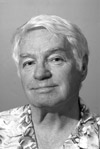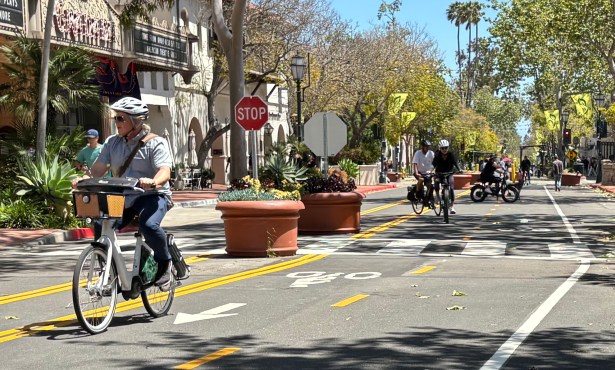The Long Road to Justice
Barney Reports on the Ongoing NLRB Trial
Justice Grinding Slooowly: I walked into the Feds vs News-Press trial on Thursday morning, freed of my subpoena bonds and pen and pad poised for hot-button testimony.

Wasn’t everything the town has reverberated with for over a year finally going to come out, slam-bang? But as I soon learned, there was no slam-bang going on.
This may be the Trial of the Century when it comes to newspaper labor law, but what I found inside that courtroom only a well-paid paralegal or a highly motivated reporter could stay awake for. And, from what I saw in the less-then-half-full room, that accounts for nearly everyone there.
This wasn’t Perry Mason. I very much doubt if we’ll ever see it as a tense Broadway drama or musical. Dark-suited lawyers did not wrestle on the courtroom floor, or even shake their fists, wave their arms, or scream vicious curses at one another.
Witnesses were nearly inaudible to those of us in the audience. Well, not really an audience. That implies that it was some sort of performance for our benefit. Presiding was administrative National Labor Relations Board Judge William Kocol, in 1950s horn rims, black robe, and white shirt, cool and soft-spoken.
I’ve been to louder tea parties. My wife Sue – who can fall asleep during the Bourne movies, would have been slumped on the carpet, snoring. As one observer put it, “Trials are like the Army; long periods of doing nothing, then moments of intense action.”
True, the issues are key: Did Wendy McCaw‘s News-Press violate federal law by firing reporters and disciplining others in the newsroom, in turn thwarting their rights to form a union?
But you had to indeed be an avid follower of who-said-what during the past year or so, and endure long, tedious soporific spells of document rustling, to realize when a moment of vital testimony had been murmuring aloud.
When NP Human Resources Manager Yolanda Apodaca – who testified Thursday about why and how she knew who was pro-union in the newsroom – was asked if she knew whether a much-discussed sign-waving demonstration on a freeway overpass was a union activity, she hesitated.
If she said yes, that would demolish the NP‘s contention that management didn’t know it was a union event, protected by federal law, when it fired six of the reporters involved in the demonstration for “disloyalty.” If she said no, it would sound unbelievable in view of her close knowledge of the union. So she replied with, “I don’t think I’m qualified to make that judgment.”
So she dodged the question, just as Associate Editor Scott Steepleton did last week. Former Assistant City Editor Bob Guiliano testified that he was fired days after he refused to reprimand reporter Anna Davison because, among other things, she’d mentioned Mayor Marty Blum too many times in a story.
Guiliano maintains that he’d have committed an unfair labor practice himself if he’d reprimanded her when he felt the story wasn’t biased and that he suspected he was being used as “a pawn” against a union activist. Davison was also fired.
Why was I now allowed in the courtroom despite News-Press attorney Barry Cappello‘s subpoena that banned me from the proceedings as a potential witness? The deal we worked out this week was, as with blogger Craig Smith, that if whatever it is that Cappello wants me to testify about is about to come up, I must depart the courtroom so I don’t hear what the prior witness has to say about it, whatever it may be.
The trial in the U.S. Bankruptcy Court on State Street will continue today, as well as through the weeks of September 3 and 10. It’s open to the public. It’s expected that Judge Kocol will take a month or more to hand down his decision. Justice grinds slowly.
Write On: Among the observers at Thursday’s trial was journalist and Reagan biographer Lou Cannon, there to support the reporters, he said. Cannon took time out from finishing his ninth “and last” book, entitled Reagan’s Disciple: What George W. Bush Did to the Reagan Revolution. It’s due out in January.
Cappello’s Side: News-Press attorney Barry Cappello was on the phone the other day, explaining why he aired the matter of fired reporter Melissa Evans‘s drinking problem, for which he’s been getting much flak.
Cappello’s been taken to task in this column, in the Daily Sound, and elsewhere on grounds that he needlessly raised the private matter in trial.
Cappello says he was only trying to refute claims by the National Labor Relations Board and Teamsters Union that Evans was given a low performance evaluation in retaliation for her union activities.
“If the government files a false charge, anyone’s lawyer has a solemn duty to unmask the charge for what is it: False,” Cappello emailed me. “We did our duty. On direct examination, I had the right to prove that the evaluation was lowered for a variety of reasons, including a telephone call received about her physical condition, her admission of substance abuse as her problem, and her one-month voluntary medical leave,” Cappello said.
But so far, no one has produced any evidence that Evans’s drinking had anything to do with her performance as a reporter. Last year, she says, realizing that she had a problem, she went to News-Press Human Resources Manager Yolanda Apodaca and asked for a month’s leave to deal with it. Apodaca promised confidentiality, Evans said. But instead, Apodaca told Associate Editor Scott Steepleton.
You might expect any progressive business to support an employee who has the courage to come forward and admit a problem and seek help. The News-Press, however, in its battle against the union, used it against Evans.
Then there’s the matter of that mysterious phone call. In his testimony last week, Steepleton told Cappello that he received a phone call, in Cappello’s words, “about Ms. Evans and her physical condition.”
It has yet to be explained who phoned, whether it was an anonymous caller, and what was said. When I asked Evans she replied that she could only guess that the phone call-“if it is what I think it is-occurred when I was off duty. I can assure you it had nothing to do with my performance at work, which is what this trial is about.”
Evans was among those fired for “disloyalty” for taking part in the overpass sign demonstration incident.
Barney Brantingham can be reached at barney@independent.com or 805-962-1156. He writes online columns on Tuesdays and Fridays and a print column on Thursdays.



